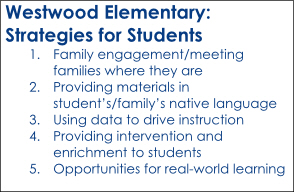Luis Gerardo Carmona moved from Mexico City to Manchester, Tenn., two years ago, with his wife and two young sons. To call it a big transition would be an understatement. Relocating from a city of 25 million people to a town of 10,000 was change enough, to say nothing of taking on a new language and culture.
The family chose their new home based on its proximity to Westwood Elementary School, which has an excellent reputation in Manchester’s Hispanic community for its work with English language learners (ELL).
Not long after the move, Mr. Carmona was glad of this decision. His five-year-old son, Matías, who was not then as proficient in English as he is now, became sick at school and was unable to communicate how he was feeling. It was a difficult situation for Matías but then a Spanish-speaking school receptionist stepped in to comfort the boy and translate for the school nurse, and Matías was feeling better by the time his mother arrived to take him home. Later that evening, three different school staff members all phoned the family to check on Matías.
“They take any chance, any opportunity, to really embrace the kids,” Mr. Carmona said. “It’s like a big family. They invite and take every chance to bring new people on board.”
This family’s experience is all in a day’s work for Westwood Elementary, one of the finalists for the 2014 SCORE Prize in the elementary school category. Westwood is a school that excels at providing innovative, whole-family solutions to student learning needs.
 “We really see our school as a collective family, and anyone who is connected with that, we want to make sure they feel that familial bond with us,” said Thomas Fuhrman, Westwood’s principal. “We make certain to involve everyone in our family.”
“We really see our school as a collective family, and anyone who is connected with that, we want to make sure they feel that familial bond with us,” said Thomas Fuhrman, Westwood’s principal. “We make certain to involve everyone in our family.”
All Westwood families are supported by a Family Resource Center, the site of community collaborations that have helped provide services ranging from parenting classes to financial support for school supplies. With more than 65 percent of the school’s 500-plus students receiving free and reduced meals (FARM), Westwood receives school-wide Title I services, and staff members work hard to support students in and out of the classroom.
In the case of ELL students in particular, teachers and staff say family engagement helps break the language barrier and nurture academic growth. ELL students make up more than one-fifth of Westwood kids, and this part of the school’s population is growing – Mr. Fuhrman said 10 percent of the Westwood students currently live outside the school’s district and pay tuition to attend, which is due in large part to ELL services. Westwood provides Title III-funded English classes for parents, helping families learn the basics of English as well as cultural aspects of American life. A weekly tutoring and mentoring program called Circle of Friends brings more than 100 ELL students and families from across the district to Westwood for academic enrichment and homework help. And every fall, Westwood hosts the school district’s ELL night, a program that invites families to school to see classrooms, meet teachers, and receive translated information about the school year.
Raising Student Achievement
As Westwood has welcomed families, students have demonstrated academic growth, particularly in math and science. Westwood students are 69 percent proficient or advanced in science, compared to 62 percent statewide, and the school and the school has TVAAS growth scores in math, reading, and science well above the state average.
 Mr. Fuhrman is quick to credit the school’s teachers with nurturing a culture of both high expectations and caring for students. Teachers regularly come to him with a “tremendous amount of data,” Mr. Fuhrman said, and a genuine concern for every student’s needs is always present.
Mr. Fuhrman is quick to credit the school’s teachers with nurturing a culture of both high expectations and caring for students. Teachers regularly come to him with a “tremendous amount of data,” Mr. Fuhrman said, and a genuine concern for every student’s needs is always present.
“We don’t just simply teach to the middle. We teach to every child,” Mr. Fuhrman said. “If we can’t do that on our own, we find the support that’s going to help us do that. We look for the support structures and really pursue them once we find them.”
An outdoor classroom gives kids hands-on experiences with gardening, plants, and caring for rabbits. And most recently, an $80,000 21st Century Community Learning Center Grant and a $3,500 Bonnaroo Works Fund grant provided funding for a portable Maker Lab. About 20 kids are in the lab each day after school, working with community mentors and journaling discoveries in writing. Fourth- and fifth-grade participants have assembled a Raspberry Pi computer, built circuitry, engineered a catapult, flown a drone helicopter, and experimented with a Weatherbug station now situated at the school. Like many Westwood programs, the Maker Lab offers a family component through its monthly Family Maker Saturday event.
“Any given day after school, you’ll find kids using iPad Minis to control robots,” said Mr. Fuhrman.
For Westwood special education teacher Elise Layne, the school’s success stems from student support structures that enable academic growth. A community spirit brings high expectations within reach.
“The children aren’t afraid to take risks because they feel safe in the classroom,” Ms. Layne said. “I think, when you walk through our doors, you can feel it.”
Learn more in this SCORE Prize video shot at Westwood.
